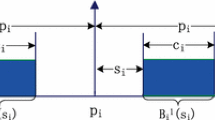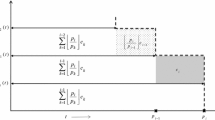Abstract
The scheduling problem, which is the core of all approaches related to real-time systems, has received proper attention from the research community. However, while preemptive scheduling has benefited from most of the results to date, the more difficult case of non-preemptive scheduling is still lacking similar achievements. This paper is approaching non-preemptive scheduling from two different angles. First, the number of processors that would allow a feasible schedule for a given task set is analyzed, yielding both lower and upper limits which can be determined in polynomial time. Second, a hybrid scheduling algorithm, combining two widely known techniques, namely EDF and LLF, is proposed and tested. A common feature of both objectives is the transition from a single-instance task to a periodic task. The relationships between these two cases are investigated, resulting in a better understanding of periodic behavior.
Similar content being viewed by others
References
Amoura, A.K., Bampis, E., Kenyon, C., Manoussakis, Y.: Scheduling independent multiprocessor tasks. In: Proceedings of the 5th Annual European Symposium of Algorithms, pp. 1–12, Springer, Berlin (1997)
Andrei, Ş., Cheng, A., Grigoraş, G., Rădulescu, V.: An efficient scheduling algorithm for the non-preemptive independent multiprocessor platform. Int. J. Grid Util. Comput. 3(4), 215–223 (2012)
Andrei, Ş., Cheng, A., Rădulescu, V.: Estimating the number of processors towards an efficient non-preemptive scheduling algorithm. In: Proceedings of 13th International Symposium on Symbolic and Numeric Algorithms for Scientific Computing (SYNASC’11), pp. 93–100, IEEE Computer Society, Timisoara (2011)
Andrei, Ş., Cheng, A., Rădulescu, V.: An improved upper-bound algorithm for non-preemptive task scheduling. In: Proceedings of 17th International Symposium on Symbolic and Numeric Algorithms for Scientific Computing (SYNASC’15), pp. 153–159, IEEE Computer Society, Timisoara (2015)
Baruah, S.K.: The non-preemptive scheduling of periodic tasks upon multiprocessors. Real-Time Syst. 32(1–2), 9–20 (2006)
Blazewicz, J., Dell’Olmo, P., Drozdowski, M., Speranza, M.G.: Scheduling multiprocessor tasks on three dedicated processors. Inf. Process. Lett. 41(5), 275–280 (1992)
Buttazzo, G.C., Bertogna, M., Yao, G.: Limited preemptive scheduling for real-time systems: a survey. IEEE Trans. Ind. Inform. 9(1), pp. 3–15. ISSN: 1551-3203 (2013)
Cai, Y., Kong, M.C.: Nonpreemptive scheduling of periodic tasks in uni- and multiprocessor systems. Algorithmica 15(6), 572–599 (1996)
Carpenter, J., Funk, S., Holman, P., Srinivasan, A., Anderson, J., Baruah, S.: A categorization of real-time multiprocessor scheduling problems and algorithms. In: Handbook on Scheduling Algorithms, Methods, and Models. Chapman Hall, Boca Raton (2004)
Chao, Y., Lin, S., Lin, K.: Schedulability issues for EDZL scheduling on real-time multiprocessor systems. Inf. Process. Lett. 107(5), 158–164 (2008)
Cheng, A.M.K.: Real-Time Systems. Scheduling, Analysis, and Verification. Wiley, New York (2002)
Coffman, E.G., Graham, R.L.: Optimal scheduling for two-processor systems. Acta lnf. 1(3), 200–213 (1972)
Davis, R.I., Burns, A.: FPZL schedulability analysis. In: 17th IEEE Real-Time and Embedded Technology and Applications Symposium (RTAS), pp. 245–256, Chicago (2011)
Davis, R.I., Kato, S.: FPSL, FPCL and FPZL schedulability analysis. Real-Time Syst. 48(6), 750–788 (2012)
Dertouzos, M.L.: Control robotics: the procedural control of physical processes. Inf. Process. 74, 807–813 (1974)
Dolev, S., Keizelman, A.: Non-preemptive real-time scheduling of multimedia tasks. Real-Time Syst. 17(1), 23–39 (1999)
Goemans, M.X.: An approximation algorithm for scheduling on three dedicated machines. Discrete Appl. Math. 61(1), 49–59 (1995)
Graham, R.L., Lawler, E.L., Lenstra, J.K., Kan, A.H.G.R.: Optimization and approximation in deterministic sequencing and scheduling: a survey. Ann. Discrete Math. 5, 287–326 (1979)
Grenier, M., Navet, N.: Fine-tuning MAC-level protocols for optimized real-time QoS. IEEE Trans. Ind. Inf. 4(1), 615 (2008)
Guan, N., Yi, W., Gu, Z., Deng, Q., Yu, G.: New schedulability test conditions for non-preemptive scheduling on multiprocessor platforms. In: RTSS ’08: Proceedings of the 2008 Real-Time Systems Symposium, pp. 137–146, IEEE Computer Society, Washington, DC (2008)
Hoogeveen, J.A., van de Velde, S.L., Veltman, B.: Complexity of scheduling multiprocessor tasks with prespecified processor allocations. Discrete Appl. Math. 55(3), 259–272 (1994)
Jeffay, K., Stanat, D.F., Martel, C.U.: On non-preemptive scheduling of periodic and sporadic tasks. In: Proceedings of the 12th Real-Time Systems Symposium, pp. 129–139. IEEE Computer Society (1991)
Kubale, M.: Preemptive scheduling of two-processor tasks on dedicated processors. Automatyka 1082, 145–153 (1990)
Lawler, E.L.: Recent results in the theory of machine scheduling. In: Grötschel, M., Bachem, A., Korte, B. (eds.) Mathematical Programming: The State of the Art, pp. 202–234. Springer, Berlin (1983)
Lee, S.K.: On-line multiprocessor scheduling algorithms for real-time tasks. In: TENCON ’94. IEEE Regions 10’s Ninth Annual International Conference, pp. 607–611 (1994)
Marau, R., Leite, P., Velasco, M., Marti, P., Almeida, L., Pedreiras, P., Fuertes, J.: Performing flexible control on low-cost microcontrollers using a minimal real-time kernel. IEEE Trans. Ind. Inform. 4(2), 125133 (2008)
Mok, A.K.: Fundamental design problems of distributed systems for the hard-real-time environment. Technical report, Massachusetts Institute of Technology, Cambridge, MA, USA (1983)
Ramaprasad, H., Mueller, F.: Tightening the bounds on feasible preemptions. ACM Trans. Embed. Comput. Syst. 10(2), 134 (2010)
Sha, L., Rajkumar, R., Lehoczky, J.: Priority inheritance protocols: an approach to real-time synchronization. IEEE Trans. Comput. 39(9), 11751185 (1990)
Stankovic, J .A., Spuri, M., Natale, M .D., Buttazzo, G .C.: Implications of classical scheduling results for real-time systems. Computer 28(6), 16–25 (1995)
Author information
Authors and Affiliations
Corresponding author
Additional information
Publisher's Note
Springer Nature remains neutral with regard to jurisdictional claims in published maps and institutional affiliations.
Rights and permissions
About this article
Cite this article
Andrei, Ş., Cheng, A.M.K. & Rădulescu, V. Processor Bounding for an Efficient Non-preemptive Task Scheduling Algorithm. Math.Comput.Sci. 13, 489–515 (2019). https://doi.org/10.1007/s11786-019-00395-7
Received:
Revised:
Accepted:
Published:
Issue Date:
DOI: https://doi.org/10.1007/s11786-019-00395-7




